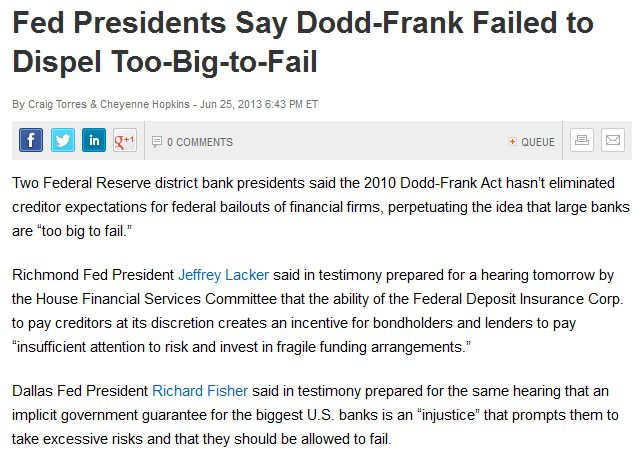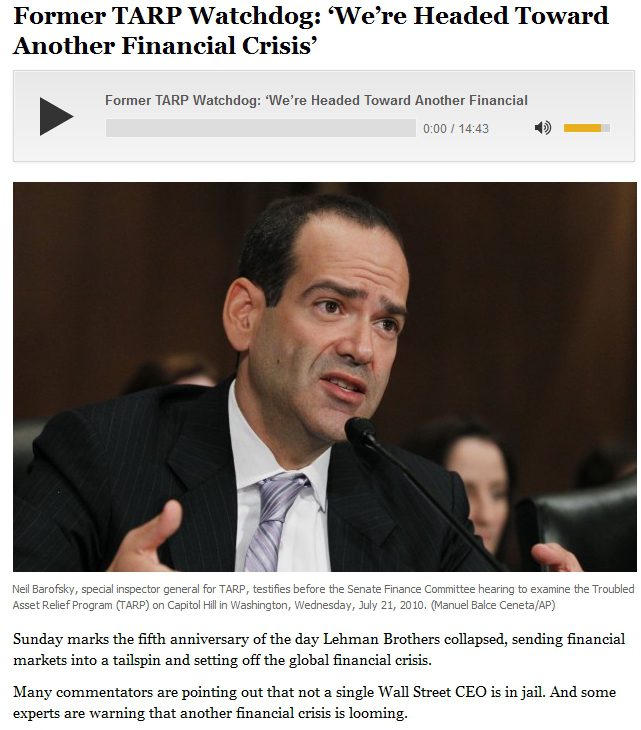If there’s one thing we know about Jonathan Chait, it’s that when he’s not projecting, he’s usually deceiving. And when he’s not projecting or deceiving, he’s probably just getting basic facts wrong. For the uninitiated, Chait is basically Paul Krugman’s id, minus the heavy burdens of subject matter expertise, educational credentials, and impressive career accomplishments.
Chait’s latest entry in the “See How Many Evidence-Free Assertions You Can Make in 800 Words or Less” essay contest is a doozy:
Five years after the financial crisis, the general expert consensus is that the Obama administration did a good but not great response job. The financial rescue measures saved the banking system from wreaking deep, widespread destruction, but preserved it well enough to live on as a noxious political-economic force. Financial reforms reduced but did not eliminate systemic risk. The auto bailout worked better than anybody could have hoped. The stimulus prevented Depression-level unemployment but wasn’t large enough to avoid a deep, grinding recovery with mass unemployment.Meanwhile, however Republicans resolve their long-term vision debate, they have coalesced around a short-term vision. It is to repeal Obamacare without a replacement, maintain short-term austerity, weaken labor laws, loosen financial regulation, and defend every tax deduction enjoyed by the affluent. I don’t see how this policy mix could be remotely defended in light of actual circumstances. Almost nobody on the right seems to want to defend it. But nobody seems interested in placing even the slightest pressure on the Congressional party to alter its stance, either.
One of my favorite Chait tics is the constant claim of “expert consensus,” combined with a total lack of demonstration that any such consensus exists, and wrapped in an arrogance that is better suited to individuals, like Krugman, who can at least claim some sort of expertise or experience in the field in which he opines. Most bloggers at least have the decency to spend 30 seconds on Google retroactively looking for an article they can link to that proves their point. But not Chait. He’s too good for that.
Let’s spend a moment or two on a few of the assertions in Chait’s first paragraph: despite the administration’s claims that today’s unemployment rate would be around 5 percent thanks to the stimulus, just about everybody agrees Obama did a “good job” with the recession; despite the perverse incentives created by the bailouts of financially irresponsible Wall Street banks and the enshrinement of “too big to fail” by Dodd-Frank, systemic financial risk is much lower than it would otherwise be; and despite the fact that the GM auto bailout is still $14 billion in the hole, it somehow “worked better than anybody could have hoped.”
Does Chait seriously not know of a single person on earth who hoped that maybe GM would eventually pay back its loan and make taxpayers whole? If so, his impersonation of Pauline Kael is straight-up amazing.
In 2010, years before the true size of the gap between the Obama administration’s stimulus promises and its reality was known, an economist was asked by the Minneapolis Fed about his opinions on the 2009 stimulus:
I had just read an Obama administration’s Council of Economic Advisers document e-mailed to me by my friend [Stanford University economist] John Taylor. I agreed with John that the CEA calculations were surprisingly naive for 2009. They were not informed by what we learned after 1945.In early 2009, President Obama’s economic advisers seem to have understated the substantial professional uncertainty and disagreement about the wisdom of implementing a large fiscal stimulus. In early 2009, I recall President Obama as having said that while there was ample disagreement among economists about the appropriate monetary policy and regulatory responses to the financial crisis, there was widespread agreement in favor of a big fiscal stimulus among the vast majority of informed economists. His advisers surely knew that was not an accurate description of the full range of professional opinion. President Obama should have been told that there are respectable reasons for doubting that fiscal stimulus packages promote prosperity, and that there are serious economic researchers who remain unconvinced.
That economist was Thomas J. Sargent, a winner of the 2011 Nobel Prize in Economics for his “empirical research on cause and effect in the macroeconomy.” Sargent better watch out, lest Chait revoke his economic expert card. For the sake of argument, though, let’s grant Chait’s argument that “almost all” economists agree with him about everything. So what? The study of science, a discipline to which Chait regularly pledges his allegiance, is about the search for truth, not consensus. Consensus, after all, was the cri de coeur of the fixed-earth Aristotelian adherents who demanded Galileo’s imprisonment.
But what about Chait’s claim that the financial system is on a much more solid foundation today, thanks in large part to the bailouts and Dodd-Frank?
 That excerpt is from this Bloomberg article, entitled “Fed Presidents Say Dodd-Frank Failed to Dispel Too-Big-to-Fail.” Oops. They apparently forgot to run their testimonies by Chait prior to submitting them to Congress.
That excerpt is from this Bloomberg article, entitled “Fed Presidents Say Dodd-Frank Failed to Dispel Too-Big-to-Fail.” Oops. They apparently forgot to run their testimonies by Chait prior to submitting them to Congress.
Well, even though “too big to fail” wasn’t completely eliminated, at the very least we don’t need to worry about an impending financial crisis, right?
 That’s from this article, in which former TARP inspector general Neil Barofsky said, “We’re headed toward another financial crisis, I believe, because we didn’t fix the fundamental problems and the perverse incentives and the too-big-to-fail problem that was present in the last one.” Well, what does he know anyway? It’s not like he has his own column for New York Magazine or anything.
That’s from this article, in which former TARP inspector general Neil Barofsky said, “We’re headed toward another financial crisis, I believe, because we didn’t fix the fundamental problems and the perverse incentives and the too-big-to-fail problem that was present in the last one.” Well, what does he know anyway? It’s not like he has his own column for New York Magazine or anything.
It’s one thing to claim only Democrats have a plan to address economic malaise and inequality. It’s another thing entirely to make that claim after more than four years of a Democratic presidency, two of which included total Democratic control of political power in Washington.
Nearly five years after Hope and Change swept into power, U.S. income inequality is at a record high, corporate profit shares continue to skyrocket while labor gains from corporate growth dwindle, and real wages continue to stagnate.
Maybe instead of pretending that no Republicans have plans to address the new economic normal of scarce jobs, low wages, widening inequality, and sky-rocketing health care costs, Chait should spend some time coming to grips with the fact that the liberal policy platform his allies began building in 2009 has only made those problems worse.



